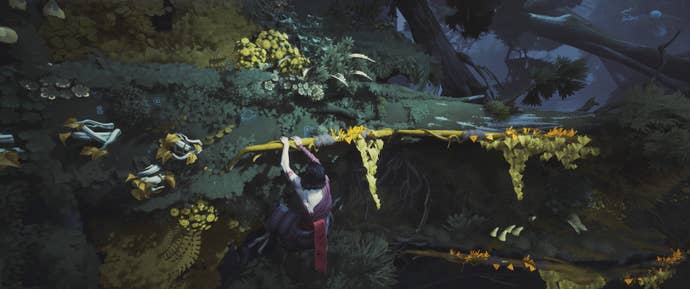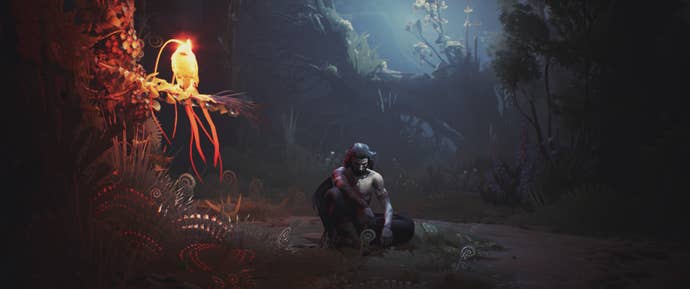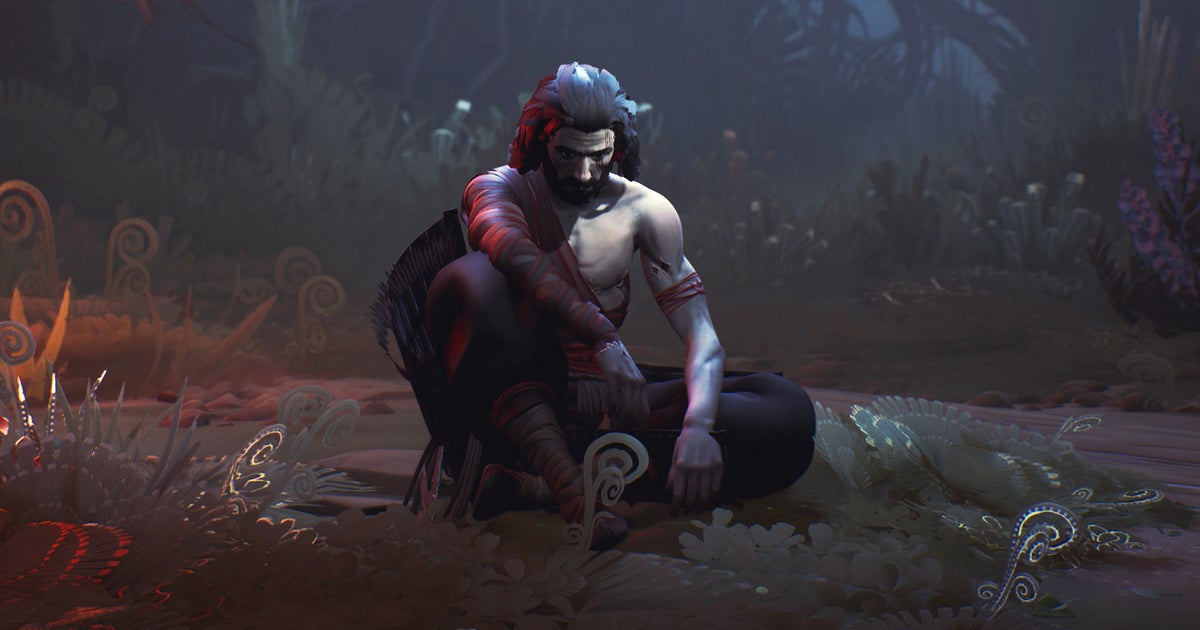Late last December, 11 bit Studios, the Polish developer of This War of Mine and the Frostpunk series, announced it had cancelled a long-in-development console-focused game known as Project 8. This had been in development since 2018 and had cost the studio nearly £10m. Until now, though, all we’ve known about Project 8 was that it was a “narrative-driven, story-rich game” – CEO Przemysław Marszał used those words when referencing the game’s genre, which he said held stronger market appeal when it was conceived. And now that I’ve seen the cancelled game in action, I have a better idea of what he meant.
Project 8 was a significant departure for a studio known for gritty strategy games that are thick with moral dilemmas. A two-minute gameplay video taken from a milestone prototype build and shown to me by Marszał, reveals a third-person action game in a bright, colourful, fantasy world. Project 8 had deeper themes running through it – the overriding idea was for players to move through the five stages of grief after losing a loved one – but the overall style and action-focused gameplay was unlike anything 11 bit Studios has ever done.
In Project 8, you played as a slender, masculine character with pale skin and long dark hair, whose body was half-covered by a kind of magical wrapping or bandage, which could detach from their arm to serve as a kind of weapon. They also carried a slingshot for distracting and harming enemies, reminiscent of the slingshot in the A Plague Tale series – a series Marszał references while talking about the game. The focus of Project 8 was stealth rather than straight-up combat, with climbing and traversal, and environmental puzzle solving, usually in relation to strange obelisks found floating around the world – a world full of oversized plants and unusual creatures.
The demo reminds me, by turns, of Prince of Persia, Rime, A Plague Tale and Hellblade – another series Marszał references. Oh and the more recent South of Midnight. “When we look at it, it does look a bit like South of Midnight – with less fighting,” Marszał says.

So what went wrong?
Marszał says there are three reasons Project 8 was ultimately cancelled, but to understand them properly, we have to go back in time a bit, to a period just after Frostpunk 1 was released, in 2018. That game did very well for 11 bit, as This War of Mine had four years earlier, so the company was flush with cash. And that meant growth. “We scaled up everywhere,” Marszał says. “From the company that was around 90 [people], we scaled up to – currently it’s around 280. It was crazy growth. Very optimistic. We had a lot of money from This War of Mine. We had a lot of money from Frostpunk – it sold crazy again. We had a lot of money and what to do now?” The answer was to take a risk.
“We felt like it would be possible to do another game in a totally different genre, with a bit of a crazy difficult topic, with a new team,” he says. “And it was a bit too optimistic to be honest. We thought a lot about it so it wasn’t like ‘hey let’s do it’, but going back, it was a bit too optimistic, and thinking that games are easy. And making games isn’t easy. It’s very difficult stuff.”
11 bit Studios wanted players to really feel each stage of grief as they moved through them, but this turned out to be a really tricky concept to manifest. After all, how do you make people feel denial? How do you make people experience bargaining? And what does acceptance look like? “It was difficult stuff,” he says.
Curiously, Marszał wasn’t aware that Rime tackled the same subject as Project 8: moving through the stages of grief – a subject I previously talked at length about with Rime’s director Raul Rubio. And again, it was a subject that sounded anything but easy to realise. When I tell Marszał this he smiles, as if relieved Project 8 didn’t go ahead. “Good to hear that,” he says,
There were other issues with Project 8 too. The stealth gameplay required more thought than typical, straight-up combat. It revolved around avoidance, but how could 11 bit make that fun? And there were problems with narration and getting the story across. The design was there on paper, then, but when built out, significant issues were showing with it. The only playable parts were a prologue and a denial level after it. “So,” says Marszał, a “crazy amount of work still to do.”

As a result, production began to slip. “Another delay after delay,” Marszał says. “And when we heard that we need to add another year or two to the production time it was like ‘wow’.” A decision had to be made.
This is when 11 bit Studios looked at the wider market to see whether it was worth, in its opinion, carrying on, and where Marszał’s remark above narrative-driven, story-rich games no longer holding the appeal they used to came from. What he means is a particular type of game: the Hellblades and Plague Tales of the world. Games that had huge excitement a first time around but less by the time of their sequels, he says.
“I’m not saying that there aren’t players for those games,” he adds. “There are. But the market is different,” Marszał says. “When you see what’s going on with the market and when you see okay, your costs are growing: that was the first moment when, from our calculations, we saw, okay, we want profit; it will be negative. It could be really risky for us.”
It’s also worth considering the wider issues in the gaming industry, and the increasing pressure every gaming company seems to be under – an issue compounded, in 11 bit Studio’s case, by the rocky start Frostpunk 2 got off to.
“The last two years, it was extremely fucking hard. We were so optimistic. We were too optimistic. We did so many errors. We had problems with projects – every one of our projects was delayed,” Marszał says. Both internally developed games such as The Alters, and externally developed games for the studio’s publishing arm. This forced a top-to-bottom reorganisation at 11 bit Studios, and Project 8 was caught in that storm.
“After those seven or eight years of development, we really fought hard, the team fought hard, but we weren’t able to cross some problematic design elements,” he says. “We allowed ourselves – that was the optimism – to do too difficult a game. It had a cool premise but that wasn’t wise, especially for a team that was doing the game as a first game. It was just too ambitious. It was multiple aspects that, at the end, we knew, no, we won’t make it. Either [cancel it] or we will spend another tens of millions of dollars and fail heavily.”
The decision was made to cancel Project 8, and 11 bit Studios had to lay-off 18 people as a part of the cancellation, “which was crazy painful for us”, Marszał says.
This year, then, will be a year of reckoning of some sort for 11 bit – a time for it to prove the restructuring and delays have worked. A time to make good on Frostpunk 2 and to deliver The Alters in June, after several delays – it sounds as though a significant amount has improved and changed since I previewed The Alters in October 2023. And it’s a year of announcing what’s next – what’s next for the Frostpunk IP and perhaps what the new IP it’s working on is.
Let’s hope these games see development through.



